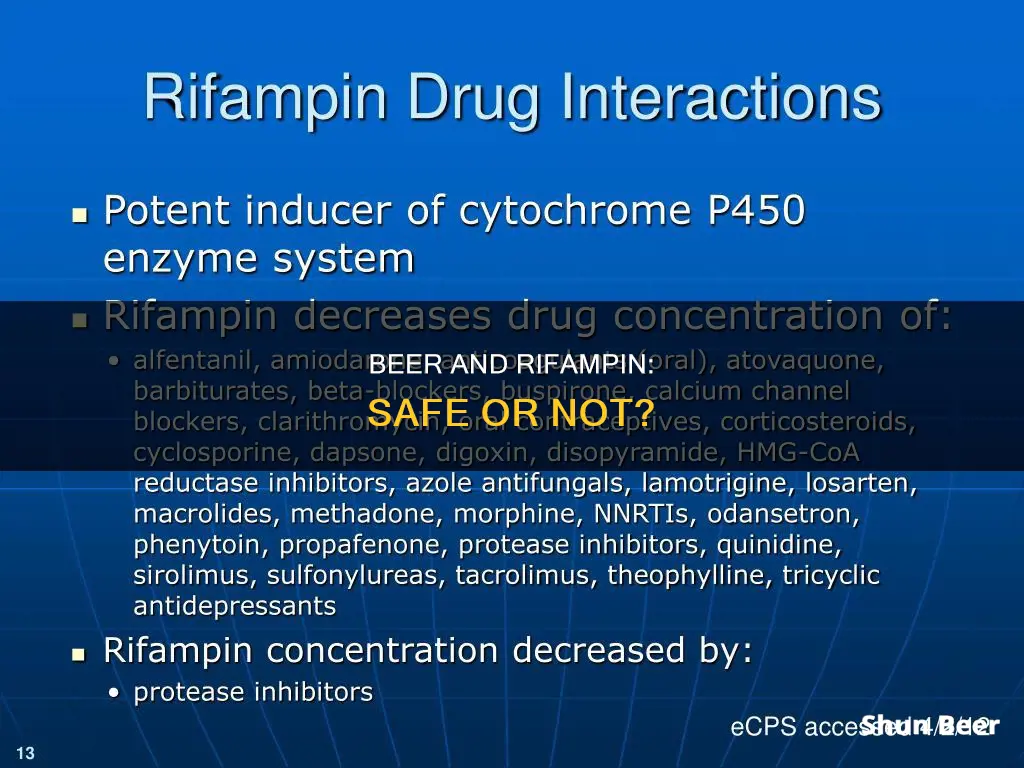
Rifampin is a medication used to treat tuberculosis (TB) and is usually given in combination with other drugs. While taking rifampin, it is generally recommended to avoid alcohol or strictly limit alcohol intake. This is because concurrent use of rifampin and alcohol may result in an increased risk of liver damage or toxicity. This risk is believed to be due to the individual effects of both substances, which can have an additive impact on the liver. However, the exact mechanism of this interaction is not yet fully understood.
It is also important to note that rifampin should be taken on an empty stomach, 30 minutes before or 2 hours after meals, as food can reduce the absorption of the drug, potentially leading to treatment failure or drug resistance.
| Characteristics | Values |
|---|---|
| Alcohol-Rifampin Interaction | Concurrent use of rifampin in patients who ingest alcohol daily may result in an increased incidence of hepatotoxicity. |
| Alcohol-Isoniazid Interaction | Concurrent use of isoniazid in patients who ingest alcohol daily may result in an increased incidence of both hepatotoxicity and peripheral neuropathy. |
What You'll Learn

Rifampin and alcohol: what are the risks?
Rifampin is a medication used to treat tuberculosis (TB), and it can be dangerous to mix with alcohol. Alcohol use is a key driver of poor TB treatment response, and those who drink heavily tend to have delayed culture conversion and higher rates of treatment failure, relapse, and death. While the exact causal pathways are not yet fully understood, it is believed that alcohol's negative impact on the immune system and its influence on the pharmacokinetics of TB drugs play a role in poor TB treatment outcomes.
Impact on the Immune System
Alcohol consumption can inhibit the immune system's ability to fight TB by impairing the function of macrophages, dendritic cells, neutrophils, and T cells. It can also decrease the production of growth factors and interfere with the interferon gamma pathway. As a result, alcohol can make it harder for the body to effectively fight off the TB bacteria, leading to worse treatment outcomes.
Pharmacokinetic Effects
Alcohol can also alter the absorption, distribution, metabolism, and excretion of TB drugs, affecting their effectiveness. This can lead to subtherapeutic drug levels and increase the risk of treatment failure and the development of drug resistance. Additionally, alcohol can increase the risk of hepatotoxicity, especially when combined with certain TB drugs like isoniazid.
Recommendations
It is generally recommended to avoid alcohol consumption while taking rifampin and other TB medications. Patients who use alcohol concurrently with rifampin or have a history of alcohol use disorder may require additional monitoring of their liver function during treatment. It is crucial to follow the prescribed dosing instructions and avoid alcohol to ensure the best treatment outcomes and minimize the risk of adverse effects.
Root Canal Recovery: Beer, Yes or No?
You may want to see also

Rifampin and alcohol: how does it affect treatment?
Rifampin is an antibiotic used to treat tuberculosis (TB). While taking rifampin, it is generally advised to avoid alcohol or strictly limit alcohol intake. This is because concurrent alcohol and rifampin use may result in an increased risk of hepatotoxicity, or liver damage. This increased risk is thought to be due to an additive effect, as both alcohol and rifampin are individually associated with hepatotoxicity. However, the exact mechanism behind this interaction has not been established.
In addition, alcohol can interfere with the absorption of rifampin. Administration of rifampin with a high-fat meal reduced the peak plasma concentration of rifampin by 36% and nearly doubled the time to reach peak plasma concentration. However, overall exposure to rifampin was only reduced by 6%. The manufacturer of rifampin recommends taking it on an empty stomach, 30 minutes before or 2 hours after meals, to ensure optimal absorption.
For individuals taking rifampin, it is important to be aware of the potential risks associated with alcohol consumption. Patients who use alcohol and rifampin concurrently or have a history of alcohol use disorder may require additional monitoring of their liver function during treatment.
Furthermore, alcohol consumption may also impact the effectiveness of rifampin in treating TB. Mouse models have shown that ethanol-consuming mice have significantly higher mycobacterial burden and impaired granuloma formation compared to controls. Additionally, alcohol has been found to inhibit the phagocytic and bactericidal activity of macrophages, decrease the number and function of dendritic cells and neutrophils, and modulate T cell function. These biological mechanisms may contribute to poorer TB treatment outcomes in individuals who consume alcohol.
In summary, while taking rifampin, it is generally recommended to avoid alcohol or strictly limit alcohol intake. This is due to the potential risks of hepatotoxicity and reduced drug absorption. The concurrent use of alcohol and rifampin may also impact the effectiveness of rifampin in treating TB, as suggested by animal studies. Patients who use alcohol while taking rifampin may require additional monitoring to ensure optimal treatment outcomes.
Exploring Beer Consumption on Mounjaro: What You Need to Know
You may want to see also

Rifampin and alcohol: is it safe?
Rifampin is an antibiotic used to treat tuberculosis (TB). While taking rifampin, it is generally advised to avoid alcohol or strictly limit alcohol intake. This is because concurrent alcohol and rifampin use may result in an increased risk of hepatotoxicity, or liver damage. This risk is thought to be due to the individual effects of both alcohol and rifampin on the liver, though the exact mechanism is not yet known.
In addition, alcohol may reduce the absorption of rifampin, increasing the risk of therapeutic failure or antibiotic resistance. A study found that taking rifampin with a high-fat meal reduced the drug's absorption by 36% and nearly doubled the time taken to reach its peak concentration.
Rifampin is also often taken in combination with isoniazid, another antibiotic used to treat TB. Isoniazid is also associated with an increased risk of hepatotoxicity when taken with alcohol. This is because both alcohol and isoniazid are associated with pyridoxine (B6) deficiency, which may increase the risk of peripheral neuropathy, or nerve damage.
Therefore, rifampin and alcohol should not be taken together. If you are taking rifampin, it is important to avoid alcohol or strictly limit your intake. If you have a history of alcohol use disorder, your liver function may need to be monitored during rifampin treatment.
Fitbit Beers: Compatible with Pixel 2?
You may want to see also

Rifampin and alcohol: what are the alternatives?
While taking Rifampin, it is generally advised to avoid alcohol or strictly limit its intake. This is because the concurrent use of Rifampin and alcohol may result in an increased risk of hepatotoxicity, as both substances are individually associated with this adverse reaction.
If you are taking Rifampin and wish to consume alcohol, there are a few alternatives to consider:
- Abstain from alcohol completely during the treatment course with Rifampin. This is the safest option to avoid any potential drug interactions and adverse effects.
- Consult your healthcare provider about adjusting the dosing interval of Rifampin. In some cases, taking Rifampin with food may reduce its absorption, which can increase the risk of therapeutic failure or resistance. However, this should only be done under medical supervision.
- Consider alternative medications that may be safer to use with alcohol. For example, certain antibiotics like penicillins, cefdinir, azithromycin, and tetracycline can generally be consumed with alcohol without significant adverse effects. However, it is important to note that this should only be done under the guidance of a healthcare professional.
- If you have a history of alcohol use disorder or are unable to abstain from alcohol, additional monitoring of your liver function during Rifampin treatment may be required. Your healthcare provider can advise you on this.
It is important to remember that the information provided here is not a substitute for medical advice. Always consult your healthcare provider before making any decisions regarding your medication and alcohol consumption.
Buspar and Beer: Is It Safe to Mix?
You may want to see also

Rifampin and alcohol: what are the side effects?
Rifampin is an antibiotic used to treat tuberculosis (TB). While there is no direct evidence of the side effects of drinking a small amount of alcohol with rifampin, alcohol can cause hepatic stress or injury, and rifampin also has the potential to cause liver damage. Therefore, it is recommended to avoid alcohol while taking rifampin.
Rifampin is part of the first-line therapy for tuberculosis, alongside isoniazid, pyrazinamide, and ethambutol. These medications are known to cause hepatotoxicity, especially when used together with alcohol. A retrospective study of 531 patients treated for tuberculosis with rifampin and isoniazid found no difference in hepatotoxicity between alcoholics and non-alcoholics. However, cases of fatal and non-fatal hepatotoxicity have been reported, and the rifampin package insert recommends caution in patients with alcohol abuse.
Isoniazid, in particular, has been associated with an increased risk of hepatotoxicity when used concurrently with alcohol. Isoniazid is often listed as a drug that can cause a disulfiram-like reaction with alcohol, which can include symptoms such as headache, palpitations, sweating, flushing, and hypotension. Additionally, isoniazid and alcohol are both associated with pyridoxine (B6) deficiency, which may increase the risk of peripheral neuropathy.
It is important to note that the available data on alcohol and antibiotic interactions are limited and often conflicting. Therefore, it is always advisable to consult a healthcare professional for specific recommendations regarding alcohol consumption while taking rifampin or any other medication.
Understanding Beer Distribution: From Brewery to Glass
You may want to see also
Frequently asked questions
It is not recommended to consume alcohol while taking rifampin. Concurrent use of rifampin in patients who ingest alcohol daily may result in an increased incidence of hepatotoxicity. The increase in hepatotoxicity may be due to an additive risk as both alcohol and rifampin are individually associated with this adverse reaction.
The side effects of drinking alcohol while taking rifampin include an increased risk of hepatotoxicity and liver damage.
It is recommended to avoid alcohol or strictly limit alcohol intake while taking rifampin.
It is not recommended to consume alcohol while taking rifampin and isoniazid. Concurrent use of isoniazid in patients who ingest alcohol daily may result in an increased incidence of both hepatotoxicity and peripheral neuropathy.







